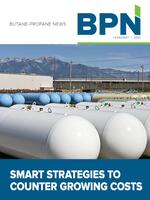
It’s that time of year again. You can see your breath—and with cold temperatures come ice, snow, sleet, and all of the crazy ground conditions of winter. Delivery representatives and service technicians are in the thick of the busy season, working long hours to take care of increased customer needs like no-heat calls and fuel run-outs on top of their normal day-to-day responsibilities. How can we protect our employees, or help them protect themselves, from winter-related hazards in the field?
TIPS TO ENFORCE PPE POLICIES AND PROCEDURES
Policies and procedures are put in place as a guideline for employees to follow and learn from, but sometimes getting everyone on board can be tricky. Employees should view personal safety as an individual choice with significant consequences. It is imperative that employees understand that the consequences of not following personal protective equipment (PPE) and safety protocols do not only affect them individually, but also impact their loved ones. This perspective can be a helpful tool for management to reach employees with the importance of adhering to PPE rules and company policies and procedures.
When discussing PPE and policies and procedures with your field employees, shine a spotlight on the reasons why everybody needs to wear proper PPE to prevent injuries with a focus on how not doing so could negatively impact their loved ones. We stand a much better chance of getting through to them with this personal message.
Then, follow up with related policies and procedures and equipment. Encourage the use of the PPE and remind your team that equipment is abundantly available. During the dangerous winter season, management can have quick meetings at the beginning of each workday to make sure weather-specific equipment such as ice cleats, proper footwear, raincoats, and other cold-weather gear are stocked and ready to go. This is also a good time to promote and inspect normal everyday PPE such as safety glasses, appropriate gloves, hard hats, footwear, etc., and review the importance of using these items in the field, even when nobody is watching.
EASY WAYS TO KEEP EMPLOYEES ON TRACK
Provide each employee with a specific PPE bag. This will protect their gear and be very helpful for field employees who are always on the go. Whether they are switching trucks or heading out to answer a service call, they can easily grab their bag and have what they need.
Encourage employees to inspect before entering. Make proactive inspection of driveways and walkways a regular part of field employee procedure during the winter. Checking the driveway and pathways for conditions like black ice or items hidden by snow before entering with a delivery truck will prevent unexpected incidents and/or injuries.
Inspect vehicles regularly. Conduct thorough vehicle inspections routinely to ensure they have proper tires for snow and ice conditions and that truck steps are free of ice and snow to prevent slipping.
Your employees are your most valuable asset. Any downtime due to injuries during the busy season can be very costly. Not only is it critical to make sure that you do your part to keep them safe, it is even more important to make sure they know that you have their back and appreciate the challenges they face every day, even in the middle of the night or over the weekend on emergency visits. Let’s not forget or devalue the importance of keeping employees safe and both physically and mentally healthy. Sometimes the simple things, like a good morning cup of coffee, small gift card, or slow cooker of chicken noodle soup, can make all the difference in their week. And in turn, maintaining employee morale and a culture of safety can make all the difference in yours. Stay safe out there!


